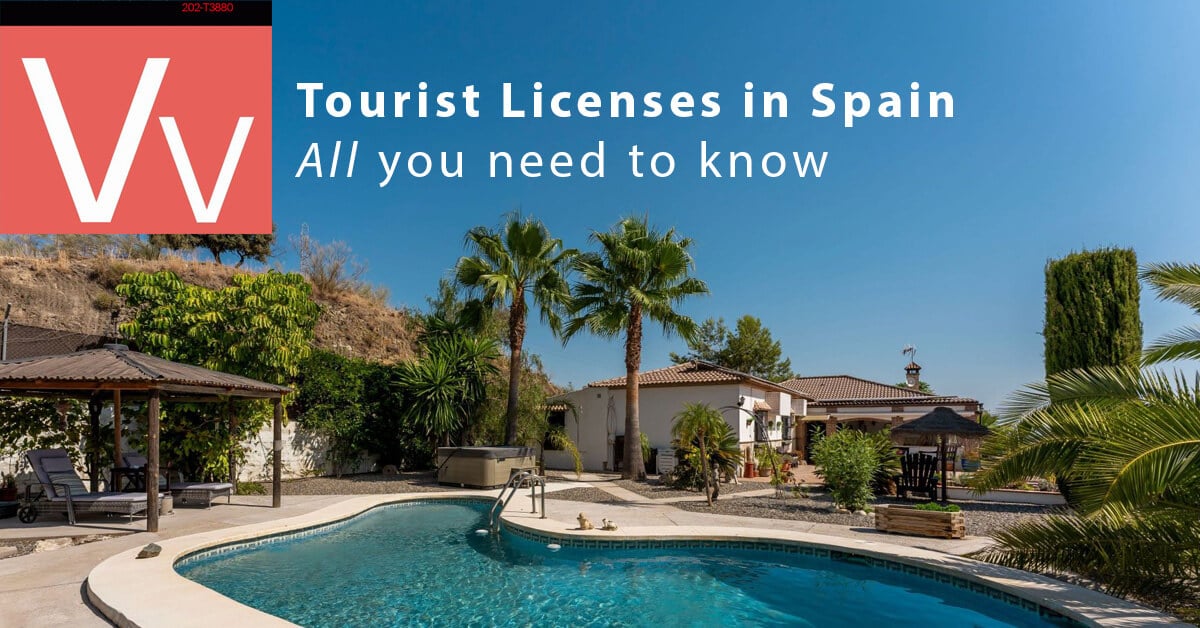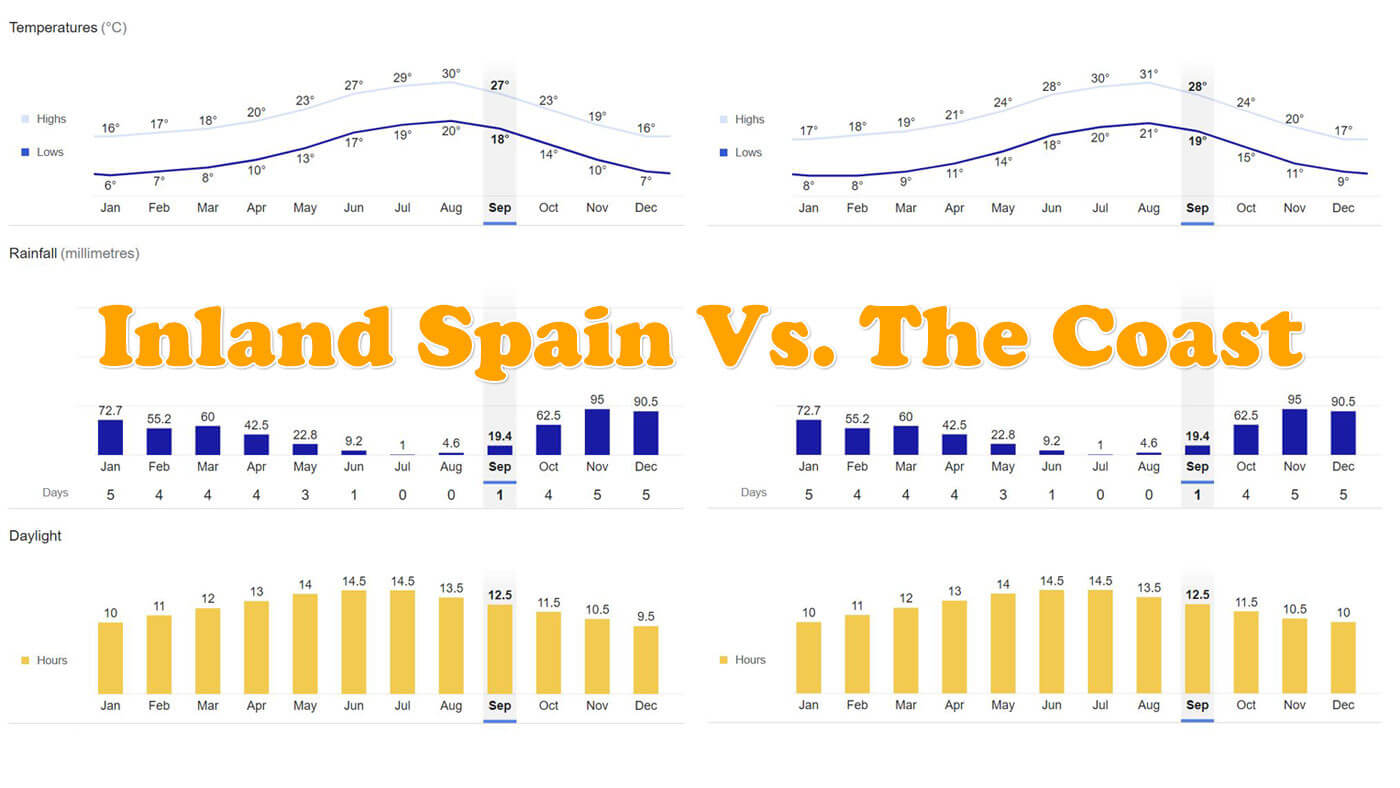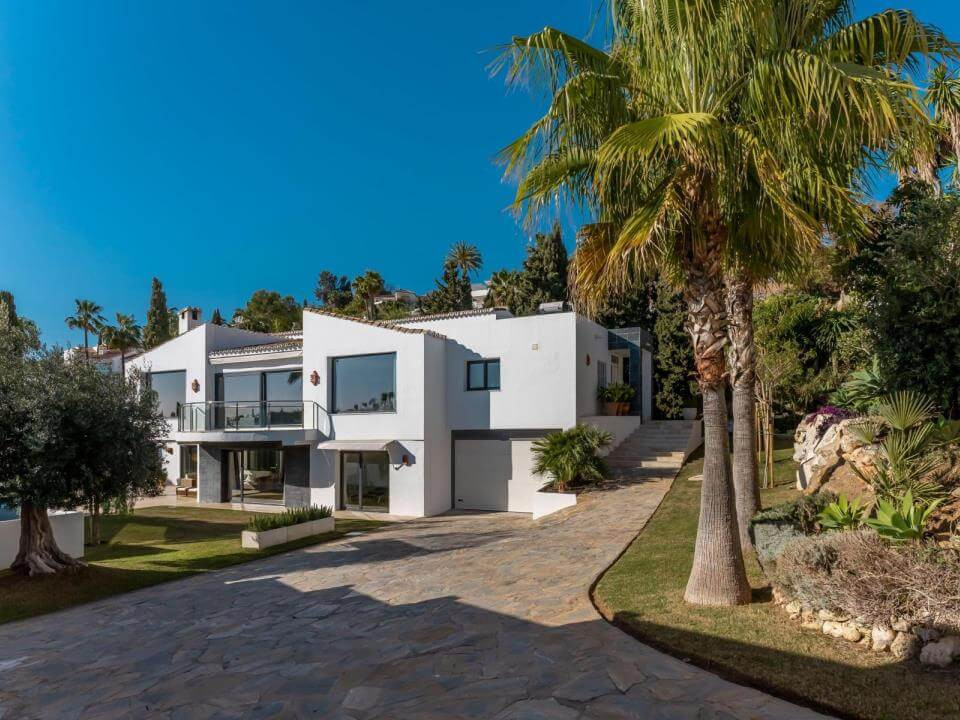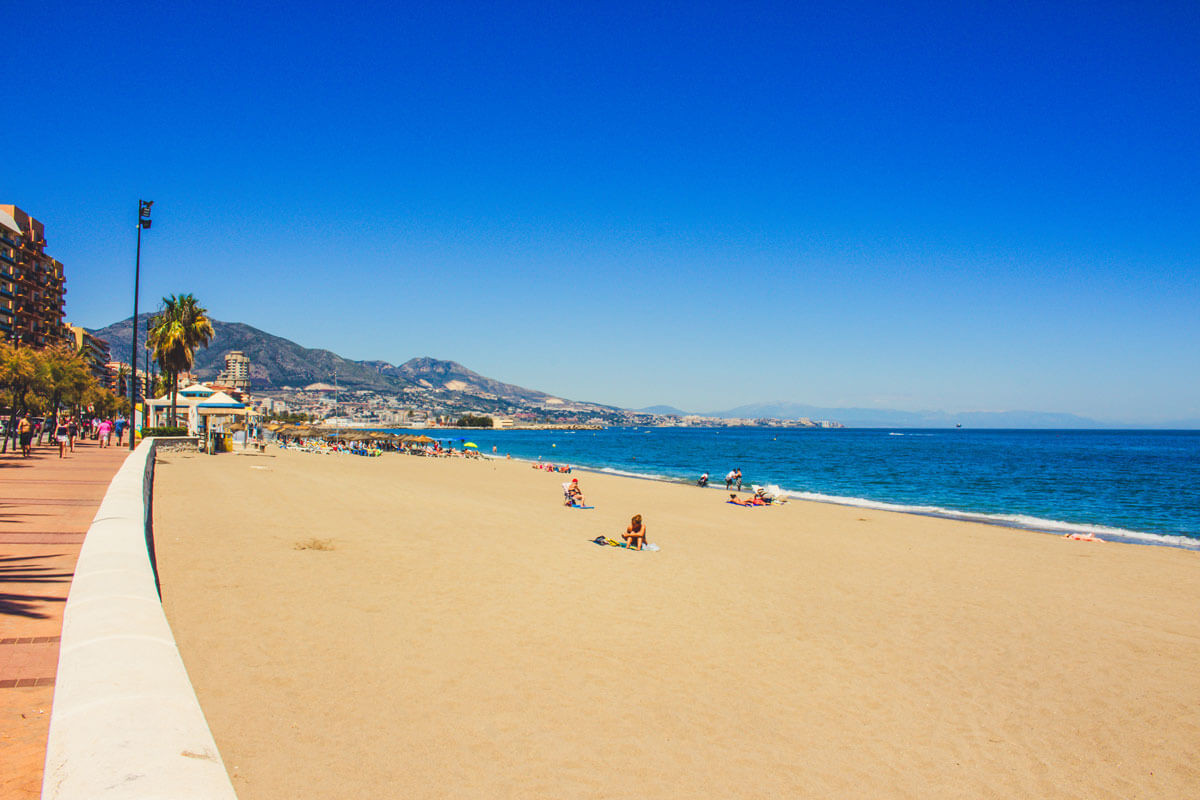Contents
How to get a Vivienda Vacacional (Tourist License)
Types of Properties that are Eligible
Tourist Licenses Allow you to...
The Limitations of a Tourist License
What Does My Property Need to Get a License?
Do I need to Pay Tax on the Income from my Holiday Let in Spain?
Marketing your Holiday Property
Is Renting out a Holiday Let Profitable? (Case Study)
Further Reading / Useful Links
Do you know someone who is looking to sell their home on the Costa del Sol? Refer them to us and receive a 300 Euro Amazon gift card! For full terms and conditions and how to apply, please follow the button below.
Introduction
Note: Updated: 15/01/2024
If you own a holiday home in Spain, you may be considering renting it out to tourists to generate some extra income. However, before you can start welcoming guests, you will need to obtain a license which adds your property to the category of "Vivienda Vacacional". This license is required for all holiday homes in Spain and is a necessary step in the process of legally renting out your property to tourists.
Here's everything you need to know about tourist licenses (vivienda vacacionales) in Spain including when they were introduced, why you need one, how to get one and even an anecdote from a client who has been through the process and is successfully letting her property on the Costa del Sol as a holiday home to tourists.
Bed and Breakfasts For Sale on the Costa del Sol
If you're looking for a business, BnB or holiday property let for sale on the Costa del Sol, we have several quality opportunities available for you.
Some businesses choose to market their businesses for sale on a "low-key" basis so it is worthwhile getting in touch with us to register your interest. There may be opportunities available that suit you that aren't being openly marketed!
View Businesses, BnBs and Holiday Lets For Sale on the Costa del Sol.
What is a Touristic License?
The Touristic License (Vivienda Vacacional) was first introduced in Spain in 2013 as part of the country's efforts to regulate the holiday rental market.
The primary goals of introducing the Vivienda Vacacional were to...
- Ensure rental properties adhere to safety regulations
- Increase tax revenues
- Help regulate competition and make it more fair for the hotel industry
- Protect the Consumer financially
How to get a Vivienda Vacacional (Tourist License)
Here is a step-by-step guide on how to search for a property suitable to purchase as a great holiday let investment and obtain a Viviendas Vacacionales License.
In Brief:
- Make a shortlist of potential properties, seek advice from professional, trustworthy estate agents who have a proven track record of selling properties in the areas you are looking in.
- Carry out your own research before committing to the purchase. Questions to ask:
- If on a complex, does the community (Comunidad) allow holiday lets?
- Does the complex charge owners a holiday rental tax? (Some charge up to 20%).
- Is there anything that will adversely affect the occupancy rate? (Distance from beach, amenities, noisy surroundings, etc.)
- Do the necessary work on the property to make it suitable to rent out as a holiday let.
- Once you have acquired the property, apply here (For property owners in Andalucia only) or contact our recommended lawyer.
- Get an inspection from the town hall.
- License issued.
- Important: Amend your property insurance and ensure it states that you are renting out your property for "Short Term" rentals.
- Start renting!
Here's a previous client's anecdote so you get to understand the process better!
Sally owns an apartment in La Cala de Mijas on the Costa del Sol that she bought as a holiday let investment.
N.B. Remember, when you're searching for a property to buy on the Costa del Sol, there is a difference between Mijas and Cala de Mijas. Mijas is located in the mountains about 16km away from Cala de Mijas which is located on the coast!
Step 1: Research and Preparation
Sally checked with a reputable estate agent on the Costa del Sol that the apartment met the requirements needed to obtain a Vivienda Vacacional. She also did her own research into what those requirements were and checked the property herself. Just like making any big investment in life, it's advisable to, "Trust, but Verify!"
Step 2: Property Evaluation
To start, Sally needed to ensure her property met certain safety and quality standards. This meant having proper amenities, safety features, and overall good conditions. She invested in some improvements to her property to meet these requirements.
Step 3: Documentation Required
Documents needed to obtain a Vivienda Vacacional:
- Proof of property ownership (Escritura/Copia Simple).
- ID: Spanish driver's license, DNI or Passport.
- Energy efficiency certificate.
- Fire safety certificate.
- Copy of the property's floor plan.
Step 4: Application Submission
With her paperwork in order, Sally submitted her application to the local tourism department in La Cala de Mijas. The authorities reviewed her application for compliance with the Viviendas Vacacionales regulations.
Step 5: Inspection
After a few weeks, a local inspector came to Sally’s property to ensure it met the safety and quality standards. Fortunately, Sally had taken all the necessary steps, and her apartment passed the inspection with flying colours.
Step 6: License Issuance
Once her property was approved, the local authorities issued Sally a Viviendas Vacacionales License. This license permitted her to rent her apartment to tourists legally.

The Cost of Getting a Tourist License in Spain
The cost of obtaining the Viviendas Vacacionales License can vary depending on the region and which lawyer or gestor you use to obtain it. Depending on the type of property, size, and work involved, lawyers/gestors usually charge between €400 and €800 per license.
In Sally’s case, it only cost her time as she’s fluent in Spanish and made the application herself by visiting the Online Tourist License Application Form for Andalucia.
In Andalucia, there is no cost to apply for the license. There are small fees to apply in other autonomous regions of Spain, however.
How long does it take to get a Tourist License in Spain?
It's a very quick process and usually takes just a few weeks.
Do I need to Renew my Vivienda Vacacional?
Once you have the license, that’s it! No need to renew yearly. However, if the property is sold then the license should be changed into the new owner’s name, this again is a straightforward procedure.
Where to Obtain the License
If you own a property in Andalucia and you're confident in Spanish then you could request the license online from the Junta de Andalucia’s virtual office.
Recommended Lawyer to deal with the Application of a Tourist License in Andalusia
If you would prefer to use the services of a professional in the region to make the application for a tourist license on your behalf, we recommend the services of English-speaking Francisco Gomez. Visit his website for contact details.
What Types of Properties Do Viviendas Vacacionales Licenses Apply To?
Viviendas Vacacional Licenses in Spain typically apply to a wide range of vacation properties. These licenses are designed to regulate and ensure the quality and safety of several types of accommodations used for short-term tourist stays. The specific types of properties that require these licenses may vary by region, but in general, they encompass the following:
Apartments: Apartments are among the most common vacation rental properties. Owners who wish to rent out apartments to tourists often need to obtain a Viviendas Vacacionales License.
Houses: Detached or semi-detached houses that are used as vacation rentals are also subject to these licenses. This includes traditional houses, villas, and cottages.
Condominiums: Condominium units in multi-unit buildings or complexes that are rented to tourists fall under the purview of Viviendas Vacacionales Licenses.
Rural Properties: In regions with rural tourism, properties like country cottages, farmhouses, and other rural accommodations may require licenses.
Bed and Breakfasts (B&Bs): If you operate a bed and breakfast and rent out rooms to tourists, you may need a Viviendas Vacacionales License.
Holiday Resorts: Large holiday resorts with individual villas or apartments for rent are subject to licensing requirements.
Countryside Retreats: Some regions have specific licenses for countryside retreats and rustic accommodations.
Tourist Apartments: In some regions, there are distinctions between "tourist apartments" and "residential apartments," with the former requiring special licenses.
Coastal Properties: Beachfront or coastal properties that are rented out for vacations are often regulated under these licenses.
Historic and Cultural Sites: In regions with historical or cultural significance, properties within these areas may require special licenses to ensure they adhere to preservation and safety standards.
Speciality Accommodations: Unique types of accommodations, such as treehouses, yurts, or houseboats, may also fall under the scope of Viviendas Vacacionales Licensing.
Regardless of where the property is located and what type of property it is, in general, each property to be rented should have the following:
- All bedrooms and living rooms must have direct ventilation to the exterior and have some form of system to darken the windows (blinds/shutters)
- Be sufficiently furnished and equipped for immediate use by the number of places to be rented
- Hot water
- First-aid kit
- A complaints book
Obtaining a Tourist License Allows you to...
Legally Rent Your Property: You can legally offer your property as a vacation rental to tourists for short-term stays. This allows you to generate rental income from your property.
Ensure Quality Accommodations: The license confirms that your property meets the required quality and safety standards, which can attract more guests and lead to positive reviews.
Contribute to Local Tourism: By operating with a license, you contribute to the regulated growth of the local tourism industry, which benefits the local economy and community.
Operate with Peace of Mind: You can host tourists without the fear of legal issues or penalties for operating an unlicensed vacation rental.
Are There Any Limits to the License?
Yes, there are typically limits and restrictions associated with the Viviendas Vacacionales License in Spain. These limits and restrictions are designed to ensure that vacation rentals are managed in a way that benefits both the property owners and the local communities. They help maintain safety and quality standards and avoid over-commercialization.
While the specific limitations may vary by region, common limits include:
Occupancy Limits: There may be restrictions on the maximum number of guests allowed in the vacation rental at any given time. These limits are often defined by the size of the property and its capacity to ensure safety and comfort.
Minimum Stay Requirements: Some regions may have minimum stay requirements, meaning you can only rent your property for a specified minimum duration, such as a week or a few days.
Noise and Conduct Regulations: You may be required to adhere to certain noise restrictions and codes of conduct to ensure that your rental property does not disrupt the peace and tranquillity of the local community.
Commercial Activity Limits: The license may prohibit certain commercial activities within the vacation rental, such as hosting events, parties, or using the property for purposes other than accommodation.
Health and Safety Standards: You will be expected to meet specific health and safety standards, such as providing necessary safety equipment and adhering to hygiene requirements.
Tax Obligations: Property owners must declare their rental income and pay the appropriate taxes. Failure to do so can result in penalties.
Insurance Requirements: Some regions may require property owners to have liability insurance to cover any potential accidents or damages that may occur during a guest's stay.
Zoning Regulations: Ensure that your property is in an area zoned for short-term vacation rentals. Some regions may have zoning restrictions that prohibit vacation rentals in certain neighbourhoods or areas.
It is crucial to familiarize yourself with the specific limits and regulations in your region, as these can vary significantly from one autonomous community to another in Spain. Property owners are encouraged to consult with their local tourism or housing authorities and carefully review the terms and conditions associated with their Viviendas Vacacionales License to ensure compliance and avoid any potential legal issues or penalties.
What Standards Does My Property Need to Meet to Obtain the Viviendas Vacacionales License?
To obtain a Viviendas Vacacionales License in Spain, your property needs to meet specific standards and requirements. While the exact standards can vary by region, here are some common requirements you should consider when preparing your property:
Safety Standards
- Adequate fire safety measures, including fire extinguishers and smoke detectors.
- Electrical systems must be safe and up to safety codes.
- Gas installations and appliances must be in good condition.
- Safe and functional staircases, handrails, and emergency exits.
- Amenities and Furnishings:
- Furnishings and amenities in good condition, including comfortable beds, seating, and appliances.
- Adequate kitchen facilities with essential cooking equipment, utensils, and tableware.
- Adequate heating and cooling systems for all seasons.
- Adequate bathroom facilities with running hot and cold water.
Cleanliness and Maintenance
The property should be clean, well-maintained, and free from pests. Regular cleaning and maintenance schedule to ensure the property's condition.
Accessibility and Safety Features
- Adequate lighting in common areas and bedrooms.
- Lockable doors and windows.
- Safety and security measures for the property and its surroundings.
- Accessibility for people with disabilities, if required by local regulations.
Documentation
- Property ownership documents and proof of authorization to use the property for short-term rentals.
- Energy efficiency certificate.
Insurance
Liability insurance to cover potential accidents or damages during a guest's stay, if required.
Compliance with Local Zoning Laws
Ensure your property is in an area zoned for short-term vacation rentals.
Noise and Conduct Regulations
Compliance with noise restrictions and adherence to codes of conduct to avoid disturbing the peace of the local community.
Health and Safety Guidelines
Compliance with health and safety guidelines related to cleaning, sanitation, and guest well-being.
Tax Declaration
Declaration of rental income and payment of applicable taxes to the local authorities.
It's important to remember that these standards can vary from one autonomous community to another within Spain, so you should check with your local tourism or housing authorities for the specific requirements in your region. Additionally, it's advisable to seek professional advice and possibly conduct a property inspection to ensure that your accommodations meet all the necessary standards before applying for a Viviendas Vacacionales License.

Do I need to Pay Tax on the Income Generated from my Holiday Home in Spain?
You are required to submit quarterly tax returns including the revenue generated and expenses incurred in the management and maintenance of your holiday rental properties. It is essential to note that these deductible expenses apply exclusively to individuals who are renting property while maintaining tax residency within the European Union. For those who employ their property as a holiday residence for personal use or for that of their acquaintances, the costs associated are not eligible for deduction.
To illustrate, eligible deductible expenses encompass items such as the community fee, the IBI (Town Hall rates), mortgage payments, where applicable, and fees associated with property management companies, should you have engaged their services. Additionally, any incurred accountancy fees are also considered eligible for deduction, subject to the condition of European Union tax residency.
Furthermore, it is imperative to recognize that should rental income be generated within Spain, tax obligations within Spain must be fulfilled. Additionally, it may be incumbent upon you to declare such income in your country of residence and fulfil any supplementary tax obligations therein.
Marketing your Buy-To-Let Holiday Rental Investment Property in Spain
Marketing and Listing Fees: If you advertise your property on vacation rental platforms like Airbnb or Booking.com, you'll need to consider the fees associated with listing your property there.
In popular tourist areas during the high season, you might aim for higher rates, while during the low season, you may need to adjust your pricing to attract guests. On average, in popular destinations, a well-managed two-bedroom apartment could potentially generate several hundred euros per week in gross income during the peak season. However, it's essential to carefully manage your property, set competitive rates, and account for all expenses and taxes to determine your actual net income.
To get a more accurate estimate, you can research local market conditions, analyze comparable listings, and consult with property management professionals who have experience in the area. Additionally, using dynamic pricing tools and optimizing your property's listing can help you maximize your earnings. Here’s a link to a local Facebook group that advertises local holiday rentals in Cala de Mijas: La Cala Rentals,
Book a Free, No-Obligation Consultation
We take great pride in providing a customised, personal service. We are a family-run estate agency business based in C specialising in rural Costa del Sol properties with over 30 years of experience. Our aim is to help you find your ideal country property in The Guadalhorce Valley region of Southern Spain.
So, let's get this process started by scheduling a video chat or in-person meeting so that we can discuss your needs and offer you some guidance regarding the purchase of real estate in Spain.
We also work with investment groups that need eyes and ears on the ground to seek out the most lucrative investment opportunities throughout the Costa del Sol region. Partnering with a specialised country property real estate agent is essential when embarking on a rural property transaction.

Is Renting out a Holiday Home on the Costa del Sol Profitable?
Here are some figures and advice from a client of ours who bought their buy-to-let investment property (a 2-bedroom apartment bought in 2018 on a complex with a communal swimming pool in Cala de Mijas).
Upfront Costs
175,000 Euros Purchase Price.
20,000 Euros Renovation Costs.
Occupancy, Rates & Seasonality
These are the costs of renting an apartment for a week in Cala de Mijas, Costa del Sol. (Correct as of November 2023)
750 Euros per week in the low season.
900 Euros per week in the high season.
Occupancy rates are currently at 90% for 2023 and the apartment is already fully booked for the next 6 months.
Low Season, or quiet times for tourism, on the Costa del Sol are between October and April, not including the half-term school breaks.
High Season, or busy times for tourism, on the Costa del Sol are between May and September.
Words of Advice
Here's some really valuable advice from our client to anyone looking to invest in a buy-to-let holiday investment on the Costa del Sol:
Rental is all about location, location, location! Don’t expect to buy and rent out all year if the place is a car, taxi drive away from the beach and town.
A rental license is a legal requirement. Without it, you will not be able to rent on any portal like Airbnb etc. or most Facebook pages. Or list it with a legal property agent.
Pay tax on your earnings. Otherwise, it will one day catch up with you.
Property licenses require certain conditions. On applying, you will have a form stating what you need.
Check with the community (Comunidad) that rental is allowed on the complex before you purchase the property!
We used a lawyer to get the license.
Quite a few communities now charge 20% more to owners who rent out so check that, too.
Only use a builder who is recommended by someone who has personally used them.
Further Reading
Tip: For any website you would like to translate, simply go to Google Translate, enter the URL (web address) and then it will take you to a translated version of that website.

Current Vivienda Vacacional Legislation
As of 2023, this is the current legislation in place regarding holiday lets in each Autonomous Community of Spain:
- Andalusia: Decree 28/2016, dated February 2nd
- Aragon: Decree 1/2023, dated January 11th
- Asturias: Decree 48/2016, dated August 10th
- Balearic Islands: Law 6/2017, dated July 31st
- Canary Islands: Decree 113/2015, dated May 22nd
- Cantabria: Decree 225/2019, dated November 28th
- Castilla y León: Decree 3/2017, dated February 16th
- Castilla-La Mancha: Decree 36/2018, dated May 29th
- Catalonia: Decree 75/2020, dated August 20th
- Valencian Community: Decree 10/2021, dated January 22nd
- Extremadura: Law 2/2011, dated January 31st
- Galicia: Decree 12/2017, dated January 26th
- Madrid: Decree 79/2014, dated July 10th
- Murcia: Decree nº 256/2019, dated October 10th
- Navarre: Foral Decree 230/2011, dated October 26th
- Basque Country: Decree 101/2018, dated July 3rd
- La Rioja: Decree 10/2017, dated March 17th
Translated Version of the latest Tourism Regulation in Andalusia
Very useful: Translated Version of the latest Tourism Regulation in Andalusia (Decree 28/2016, of February 2, on housing for tourist purposes and modification of Decree 194/2010, of April 20, on tourist apartment establishments.)
Facebook Groups
If you have any questions or would like recommendations for any services in Andalusia, active Facebook Groups can be a great source of information. If you are considering moving or investing in or around the Mijas area, you should join the "La Cala de Mijas" Facebook Group. If you come across any other useful Facebook Groups in the Costa del Sol, you can share them in the comments below!








